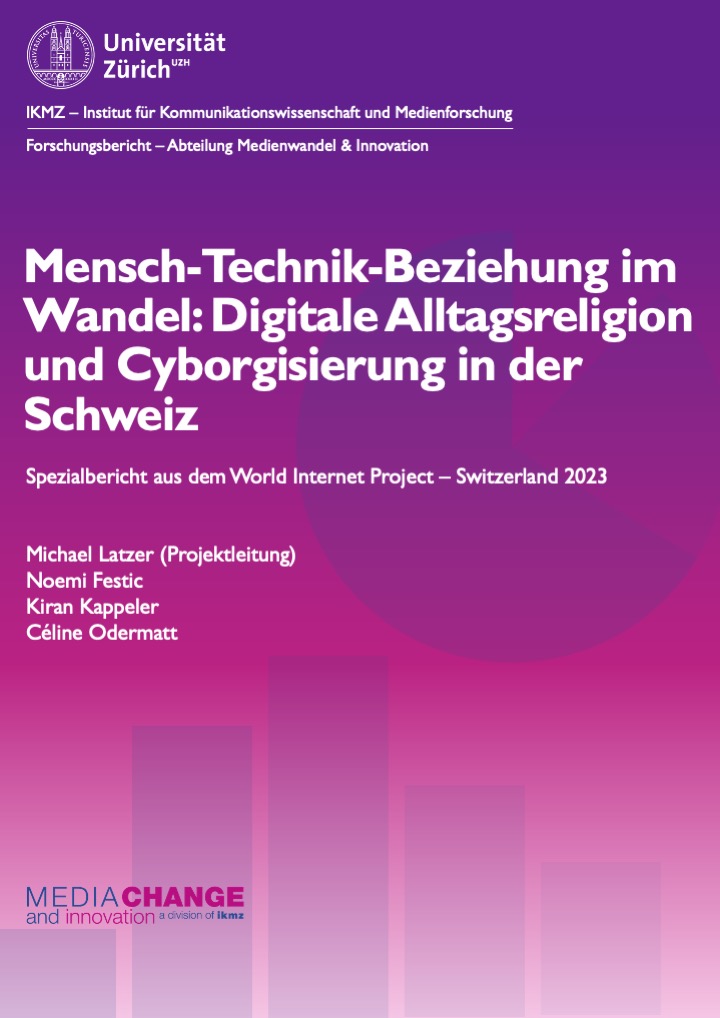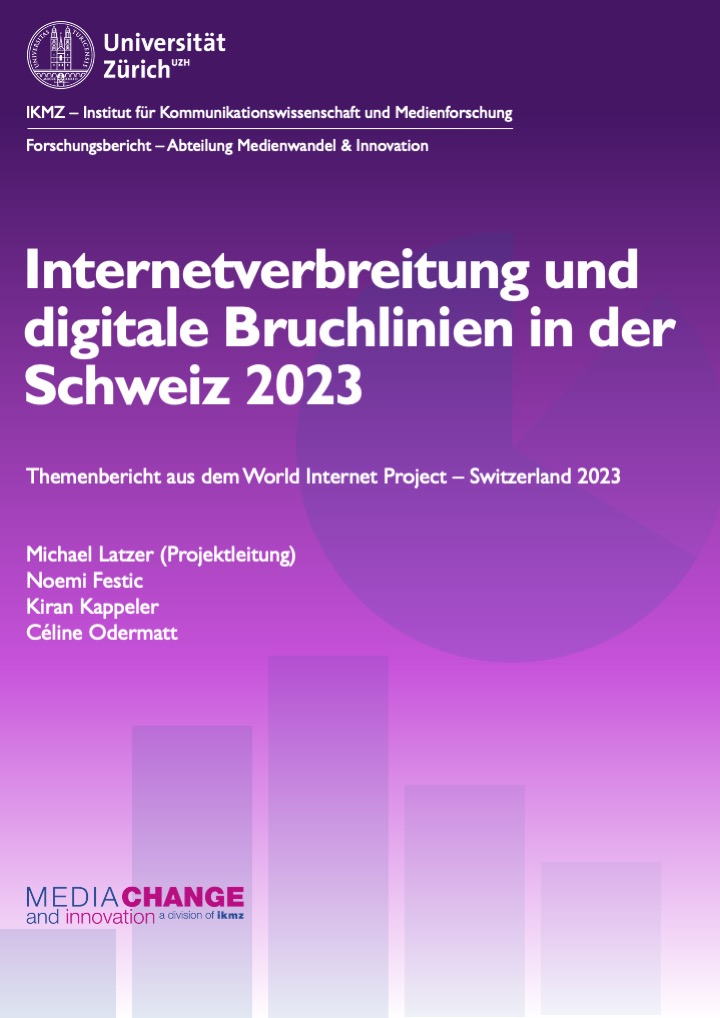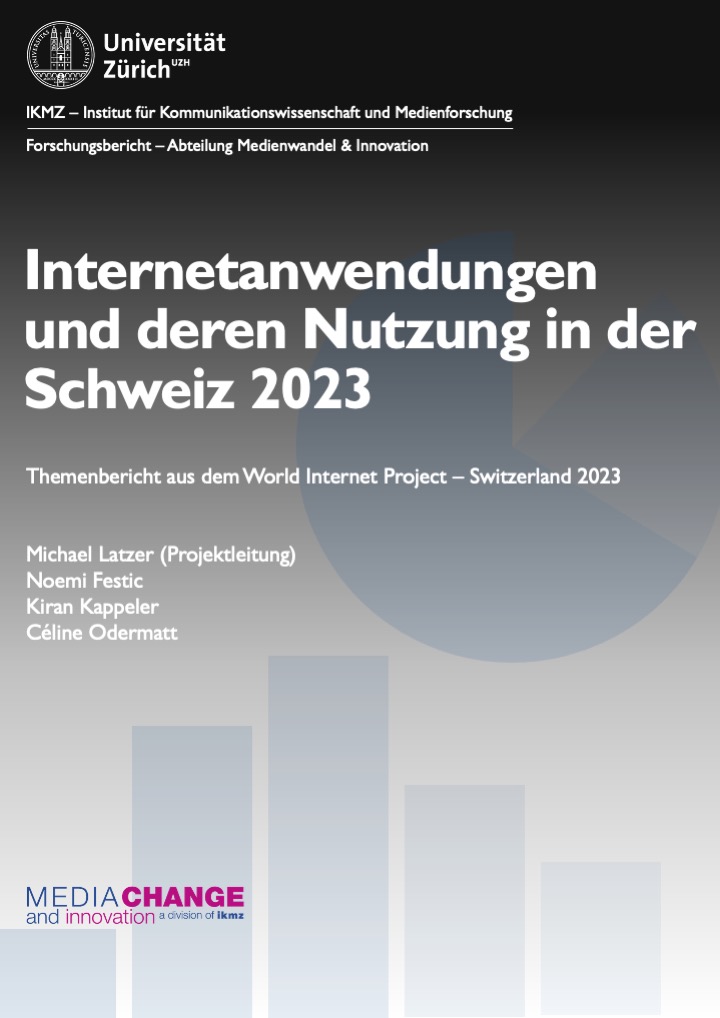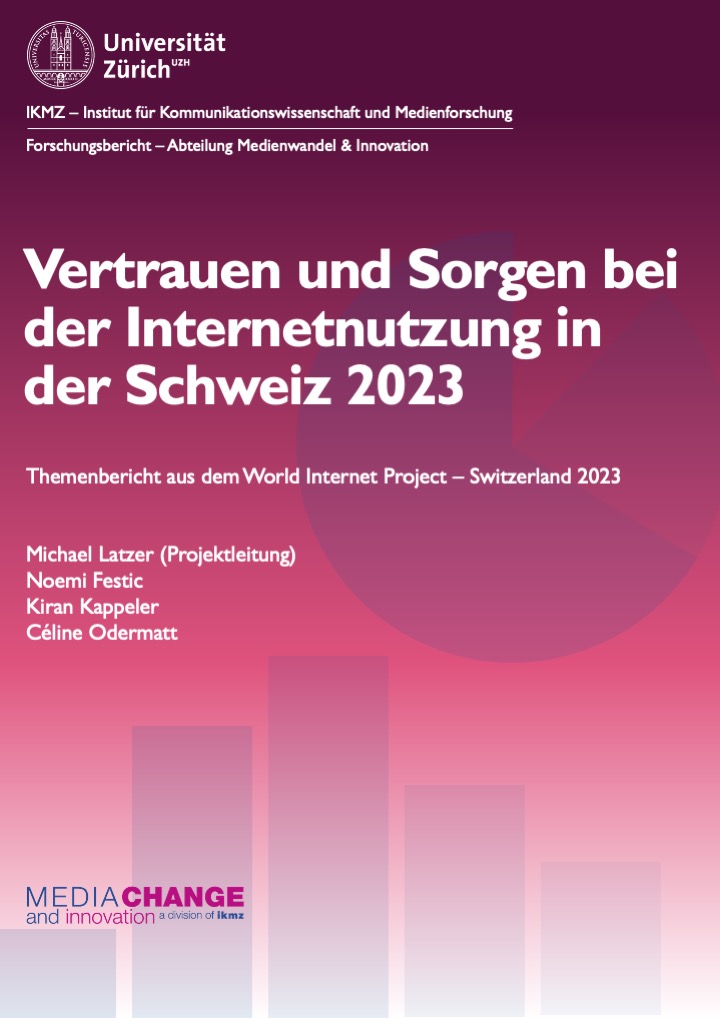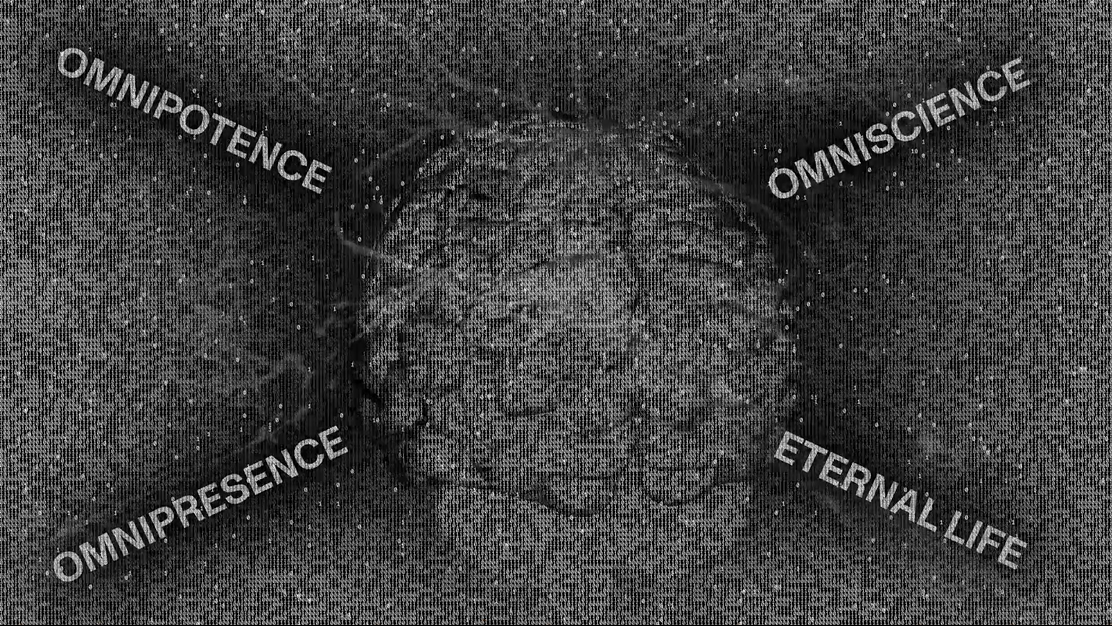News
-
Internet Use as Everyday Religion on the Rise, Cyborgization Still in its Early Stages
16th November 23
The next generation of digital technology is spreading in Switzerland: Artificial intelligence has already arrived, cyborg technologies for self-optimization have not yet. Especially among younger people, internet use is becoming an everyday digital religion. These are results of the World Internet Project – Switzerland 2023.Chatbots with artificial intelligence (AI) such as ChatGPT or Bard are already widespread in Switzerland: 8 in 10 internet users (79%) have already heard of them and half of those (37%) have already either tried (18%) or used them multiple times (19%). Younger and more highly educated people know of and use these services particularly often. “The high level of awareness and use of ChatGPT and similar AI applications is surprising, especially since they have only been available since the end of 2022,” emphasizes Michael Latzer, professor of Media Change and Innovation at the University of Zurich.
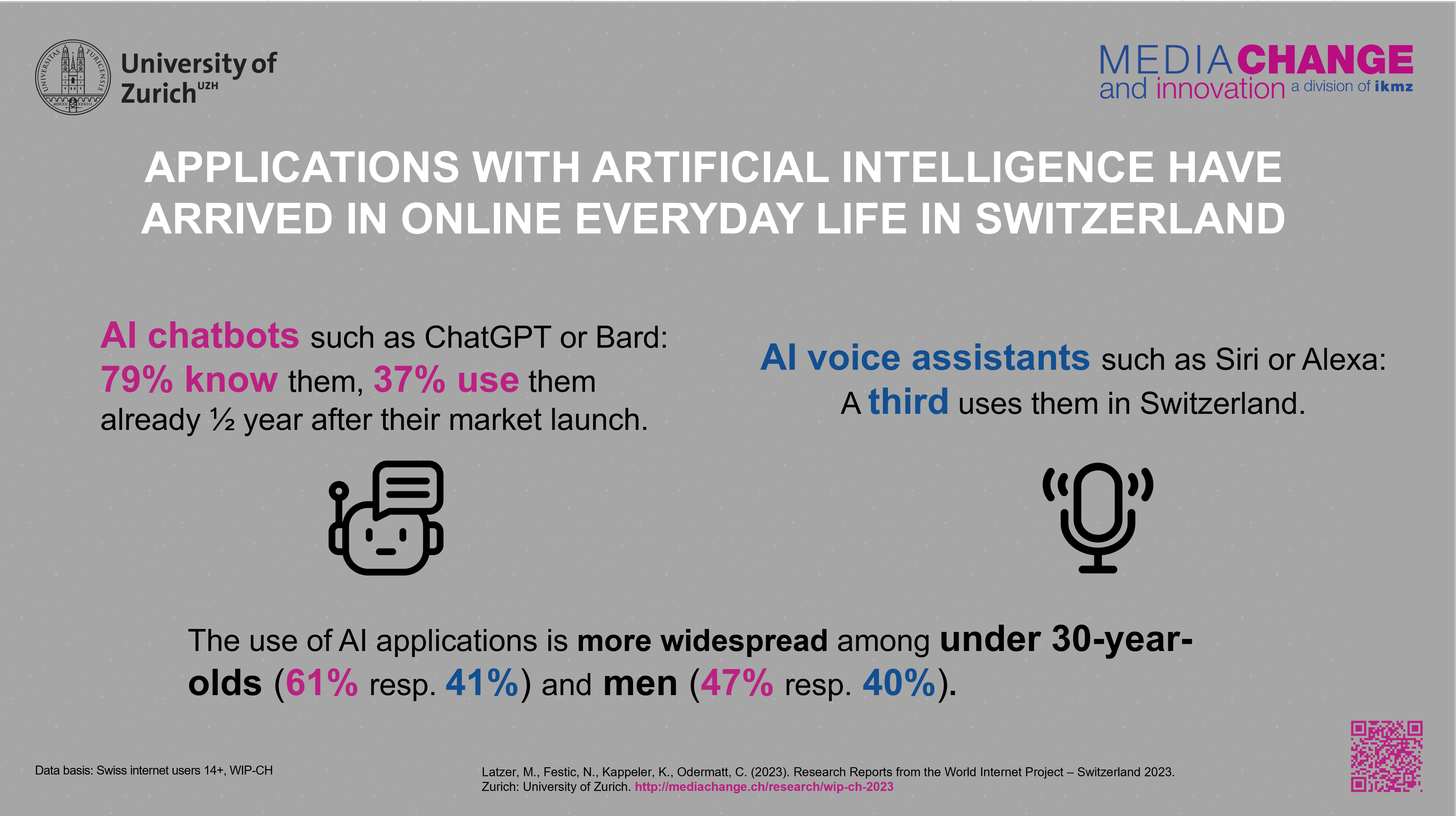
Clear indications of a religion-like digitalization
Digitalization is giving rise to a new social form of religion – an everyday digital religion. The everyday use of digital services fulfills similar social functions as traditional religions, e.g., reducing complexity, creating meaning or social cohesion. Just under a third of the population (30%) think that suggested content in social networks or health and well-being apps is controlled by an inexplicable, higher instance. For a quarter of the population (27%), internet use has become a kind of ritual: they start and end their day with it. Between 10% and 19% of internet users report transcendental experiences that exceed the usual boundaries of everyday life.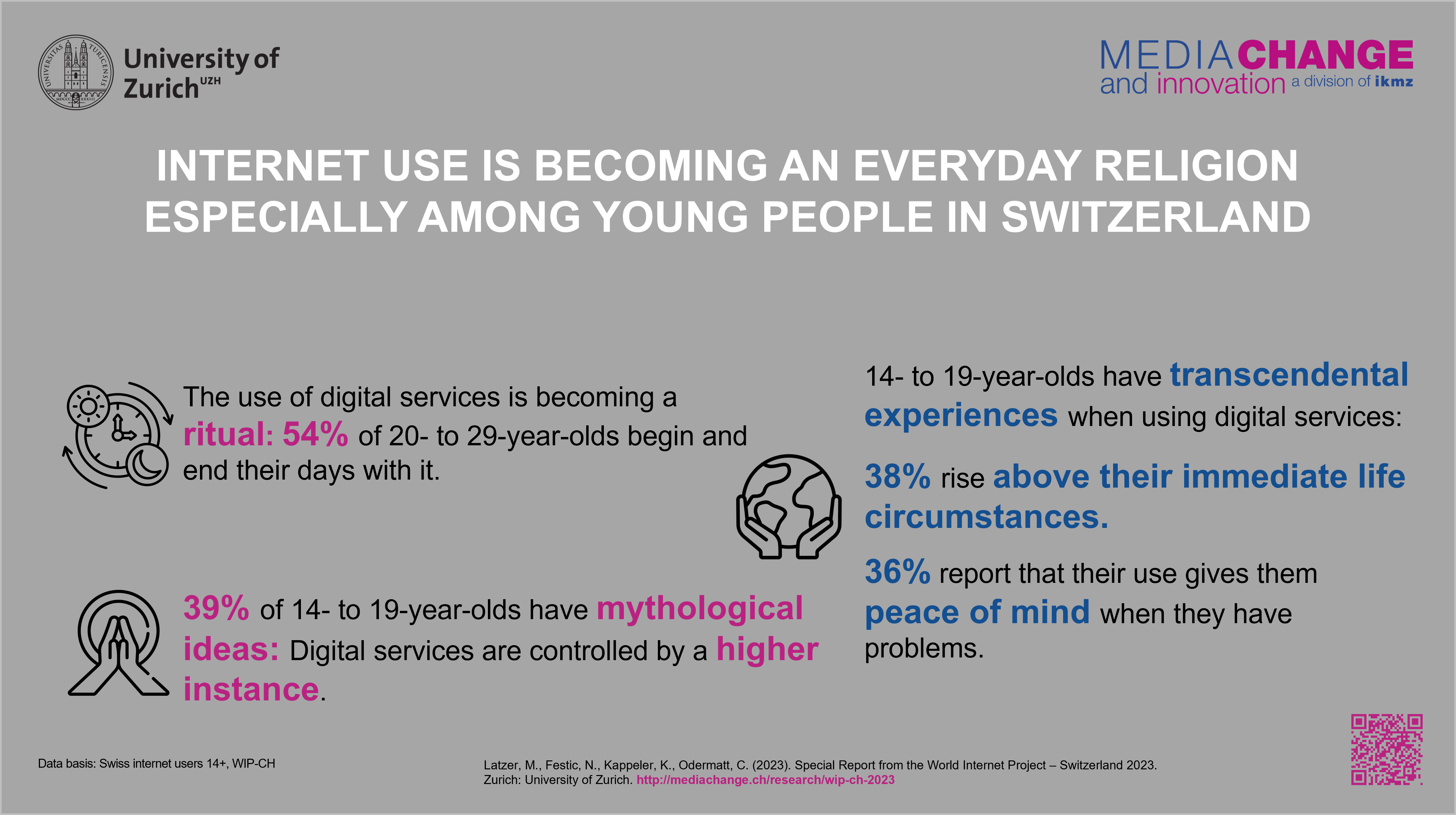
Cyborgization is still in its infancy
The merging of humans and technology known as cyborgization reinforces the religious nature of digitalization. Cyborg technologies are used to achieve transhumanist goals, i.e., overcoming human limitations and thus also reaching divine characteristics such as omniscience and eternal life. The study examines non-medically required cyborg technologies for self-optimization such as stick-on patches for electronic brain stimulation or chips implanted in the hand for making payments. They are used to improve physical and mental abilities, exceed biological limits and thereby increase longevity and well-being.A good third of the Swiss online population is familiar with cyborg technologies attached to the body (37%) or implanted in the body (35%). Their distribution is currently low and lies in the low single-digit percentage range. However, 4 out of 10 internet users believe that they could make their everyday life much more convenient by using them (39%). At the same time, there is a high level of risk awareness, particularly with regard to cybercrime (78%) and privacy breaches (70%).
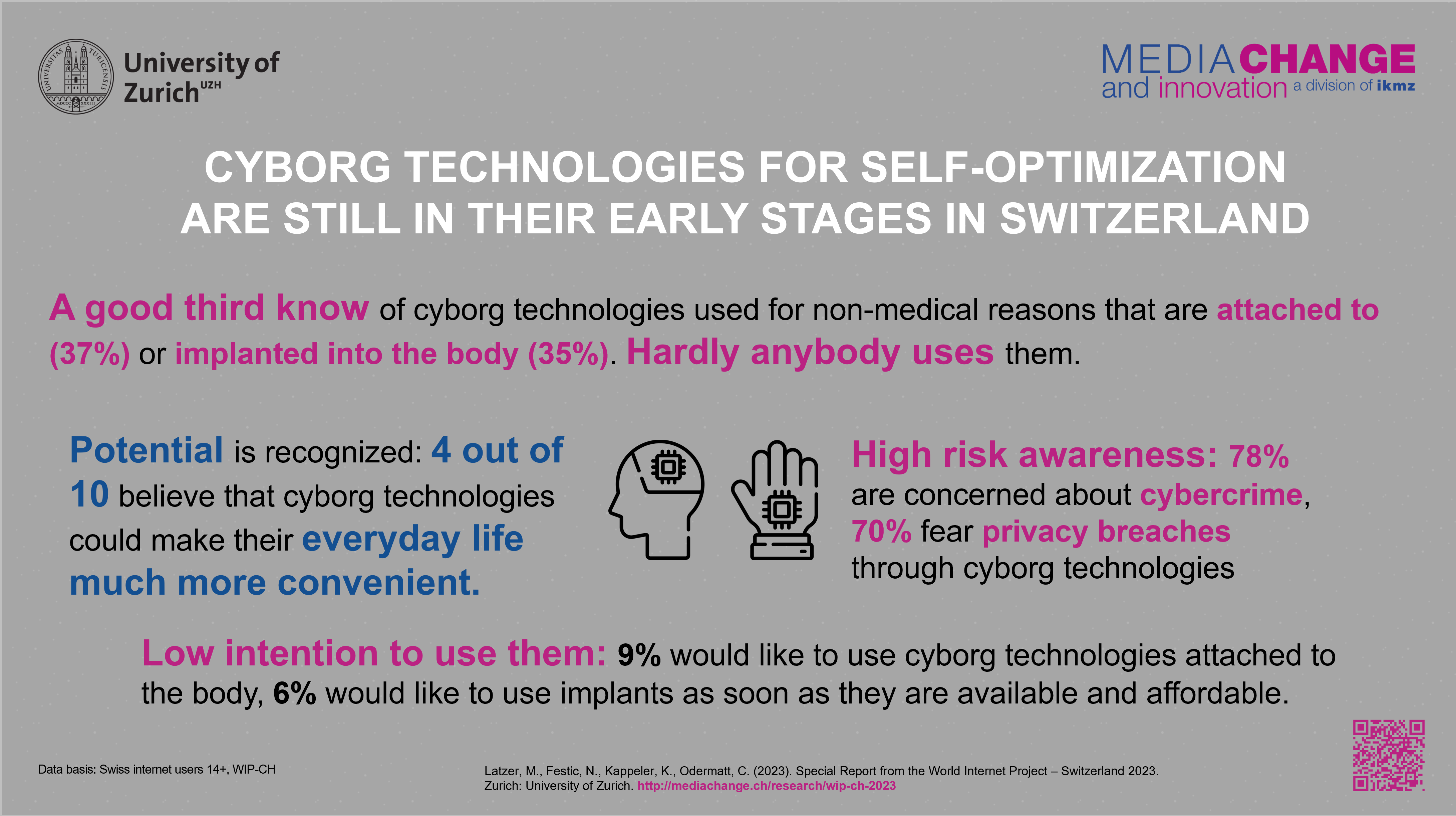
- News Release WIP-CH 2023 (in English)
- News Release WIP-CH 2023 (in German)
- News Release WIP-CH 2023 (in French)
- News Release WIP-CH 2023 (in Italian)
The full results can be accessed below in four research reports (in German) and 6 infographics.Special Report 2023: Everyday digital religion and cyborgization
Research Reports 2023 (Themenberichte)
- Internetverbreitung und digitale Bruchlinien in der Schweiz
- Internetanwendungen und deren Nutzung in der Schweiz
- Vertrauen und Sorgen bei der Internetnutzung in der Schweiz
Infographics





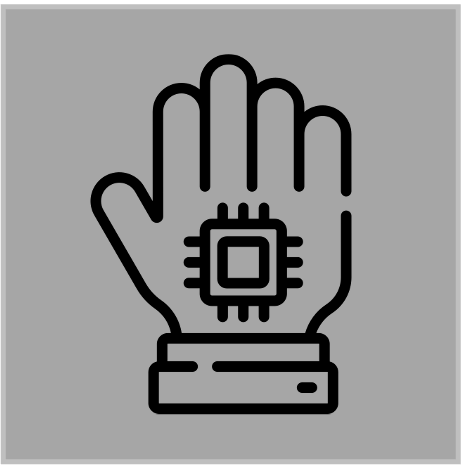
- Internet use is becoming an everyday religion especially among young people in Switzerland (English / German)
- Applications with artificial intelligence have arrived in online everyday life in Switzerland (English / German)
- Pandemic-related digitalization pushes make lasting change on everyday life in Switzerland (English / German)
- Switzerland is optimistic about the internet (English / German)
- Increasing chilling effects due to perceived online surveillance in Switzerland (English / German)
- Cyborg technologies for self-optimization are still in their early stages in Switzerland (English / German)
Icons made by Freepik, Ehtisham Abid, monkik and juicy_fish from www.flaticon.com
-
Michael Reiss successfully defended his cumulative dissertation
7th November 23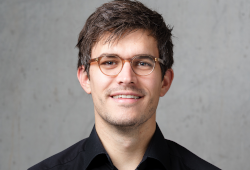
Our former team member, Michael Reiss, successfully completed his doctoral studies at the end of October. He defended his cumulative dissertation entitled “News must die for news to live. Empirical, methodological, conceptual, and theoretical perspectives on contemporary news consumption and a proposal for a normative turn.”
Michael worked for the Media Change & Innovation Division for five years. He recently joined the Leibniz Institute for Media Research | Hans-Bredow-Institut in Hamburg as a postdoc.
We congratulate him on this important achievement and wish him every success in this new stage in his career.
-
Daniela Jaramillo-Dent elected to ICA Board of Directors
18th October 23
Our team member Daniela Jaramillo-Dent will join the Board of Directors of one of the most important associations in communication and media research. She was elected Board Student and Early Career Representative of the International Communication Association (ICA) in October 2023.
Daniela will begin her two-year term in June 2024 on the closing day of the annual ICA conference, which will take place in Australia. She will support student and early career members through various initiatives and represent them at the Board of Directors meetings. She currently serves as the Student and Early Career Representative for the ICA Intercultural Communication Division.
The Media Change & Innovation Division warmly congratulates Daniela for her election. We wish you good luck in your new role!
-

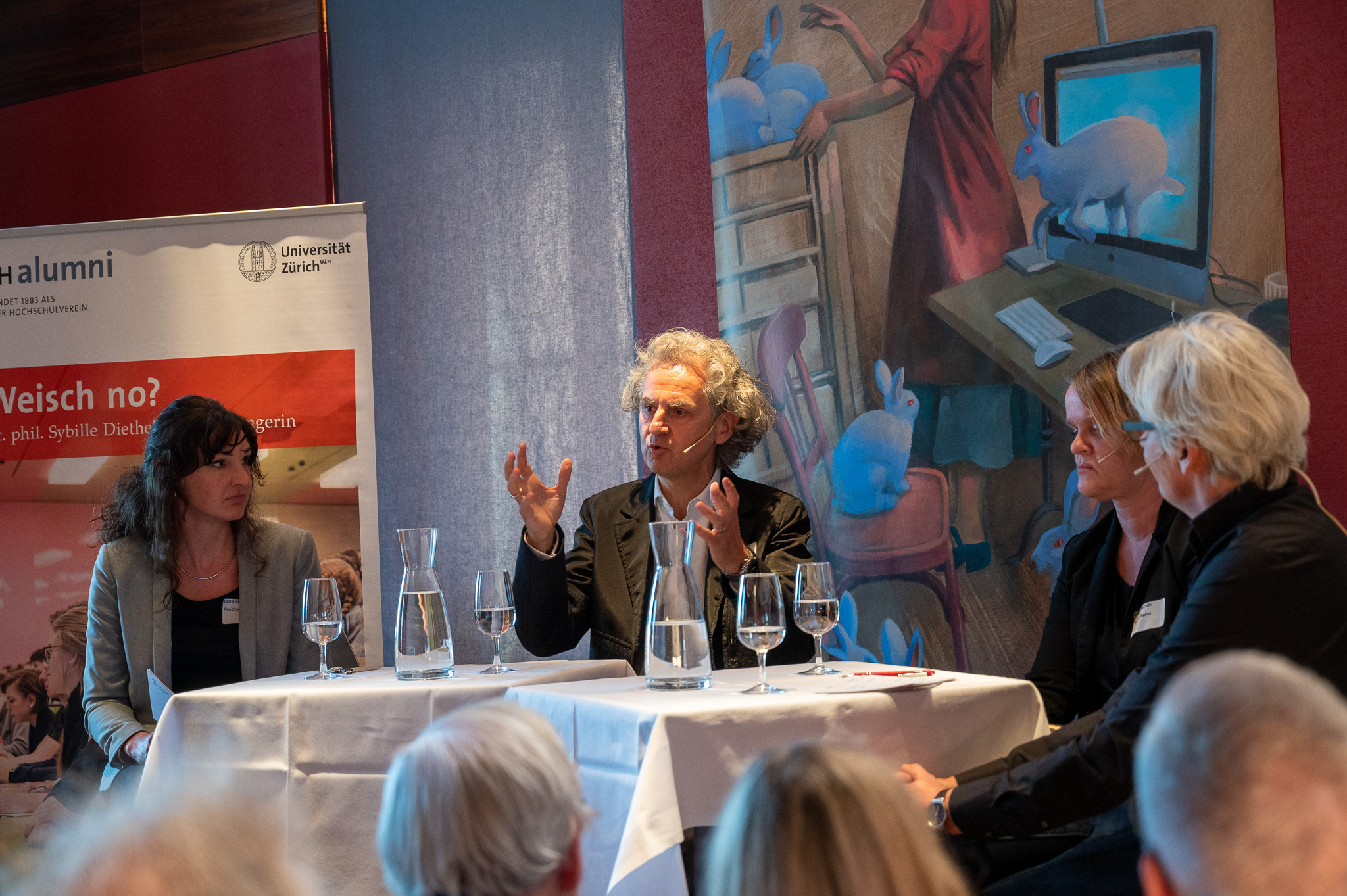
Foto von UZH Alumni
Vor zwei Wochen fand der gut besuchte Talk im Turm, organisiert von UZH Alumni statt. Michael Latzer und die Slavistin Sylvia Sasse diskutierten hier zum Einfluss von Desinformation und Algorithmen auf die Meinungsbildung. Wer das Event verpasst hat, findet hier eine Zusammenfassung und kann den ganzen Talk sogar im Podcast nachhören.
-
DSI Apéro Philo Session: Digital Wellbeing
2nd May 23Next week on 11th of May, Michael Latzer and Noemi Festic are giving a talk at the Digital Society Initiative of the University of Zurich at the Apéro Philo Session. The talk is titled: Digital Wellbeing: Conceptualization, Empirical Results, Challenges. This will be the first installment of this new format and aims to facilitate discussions in a more relaxed, friendly, and inclusive environment. Consequently, the talk is followed by a discussion and an Apéro.
You find more information and can register here: https://ethics.dsi.uzh.ch/project/apero-philo/
-
Am 18.04.2023 von 18.15 - 19.30 Uhr findet im Restaurant UniTurm ein Gespräch unter dem Titel "Göttliche Algorithmen und Putins Desinformation" statt. Neben anderen Gästen wird Michael Latzer hierbei darüber sprechen wie Digitalisierung und Desinformation Wahrnehmung und Weltbilder von Menschen beeinflussen. Ticketverkauf und weitere Infos gibt es hier: https://uzhalumni.ch/events/102271
-
Campus Oerlikon Lecture Series: Digital Worlds
22nd September 222nd Campus Oerlikon Lecture Series: Digital Worlds
On Wednesday, 28th of September, 2022 Kiran Kappeler gives a talk on ‘Challenges of Our Digitalized Everyday Life – Before and After Covid-19’ as part of the 2nd Campus Oerlikon Lecture Series- The overarching theme of the lecture series is ‘Digital Worlds: Research on Digitalization and Digitalized Research’. The event starts at 6:30 pm at Affolternstrasse 56 at the University of Zurich (Room: AFL-F-121) and is followed by an Apéro. For more information see: https://www.campus-oerlikon.uzh.ch/de/projekte-campus-oerlikon/veranstaltungen/vortragsreihe-HS22.html
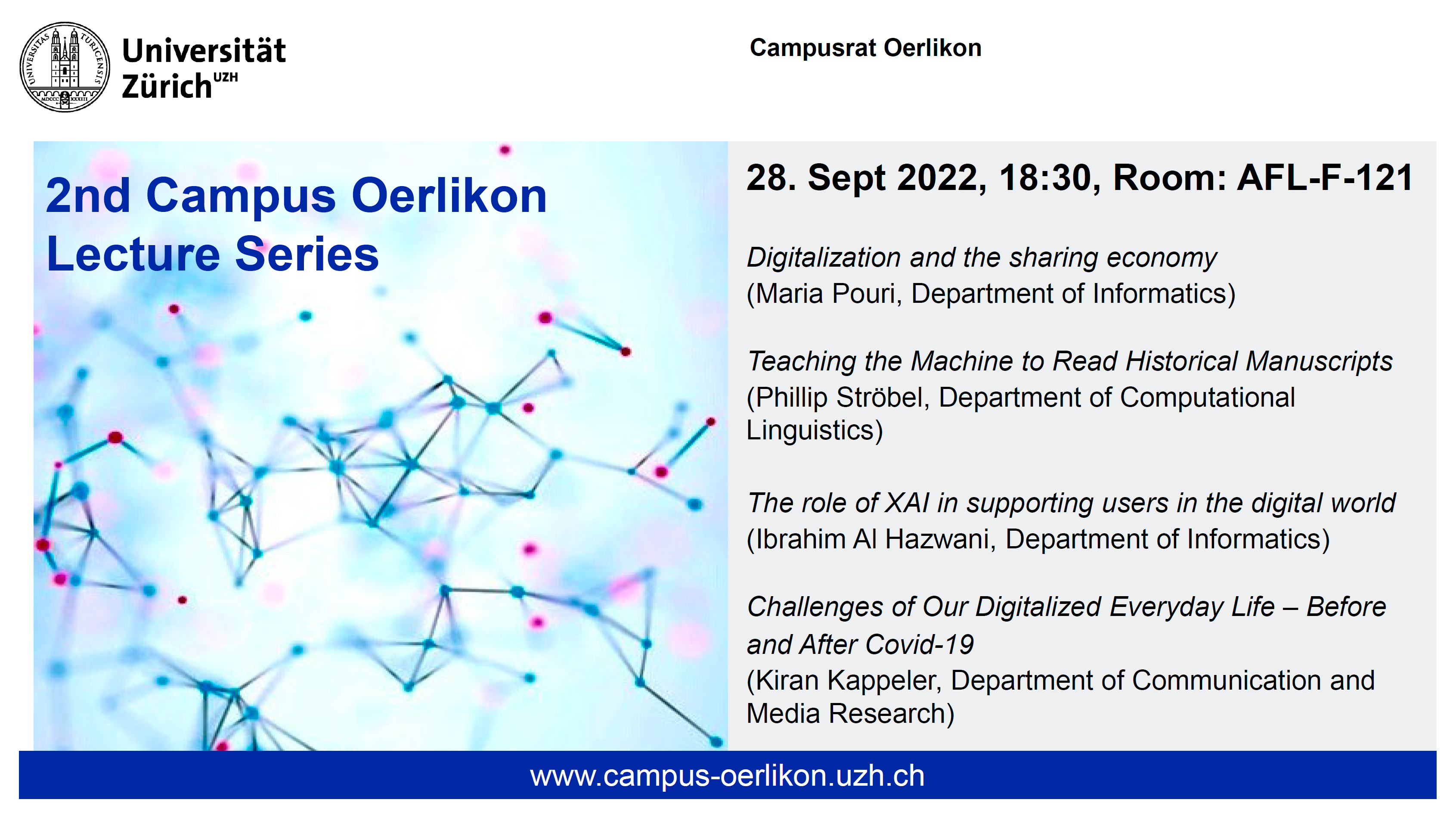
-
Public Guest Lecture: Alternative Post-Digital Futures
23rd August 22The Media Change and Innovation Division cordially invites the interested public to a guest lecture by Prof. Dr. Tsekeris on "Alternative post-digital futures: A deep technoethical foresight perspective in a turquoise world" on 6 September, 15:00 - 16:30 in AFL-E-022. We are looking forward to welcoming everyone who is interested. It is not necessary to register.More information on the lecture and on Prof. Dr. Tsekeris can be found here. -
The Media Change and Innovation Division, Department of Communication and Media Research (IKMZ), University of Zurich is seeking applications for a fully funded senior research and teaching associate / postdoctoral position in societal implications of the Internet. The successful applicant will devise and conduct original theoretical and empirical research in the area of digital media use, well-being, social impacts of algorithmic selection and AI, governance of media change, privacy, and dataveillance starting in October 2022 (see recent Publications for research focus areas and our new project on the chilling effects of dataveillance).
→ Read the full job description and apply
Contact for further information: Dr. Noemi Festic (n.festic@ikmz.uzh.ch)
-
Religion-like Digital Trinity
8th June 22What is concealed behind the sober technological facade of the omnipresent digitalization? Its current phase reveals itself to us in a threefold form, as a co-evolutionary interplay of the datafication of areas of life, the algorithmization of selection processes and the platformization of markets. The Digital Trinity is driven by the belief system of Silicon Valley prophets and transhumanism, as well as by an implicit digital everyday religion of users. It is geared towards influencing our behavior, changing our view of the world, and thus shaping a digitally transformed social order.
The corresponding journal article can be found here.
The video is available on YouTube, see below:
New layer...New layer...For the German version see here:
The Digital Trinity was presented as an immersive installation as part of the Planet Digital exhibition at the Museum für Gestaltung in Zurich from February to June 2022.
Credits: Michael Latzer, Media Change & Innovation Division, IKMZ, University of Zurich • Hubertus Design Valentin Kaiser, Kerstin Landis, Nathan Meyer, Jonas Voegli • Sound Design Andalus, Kochstudio Zürich.

